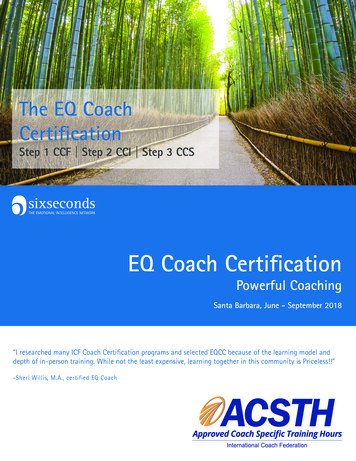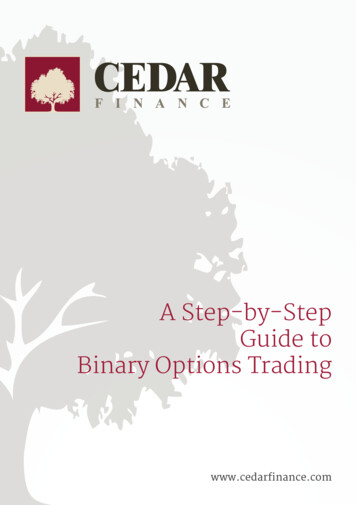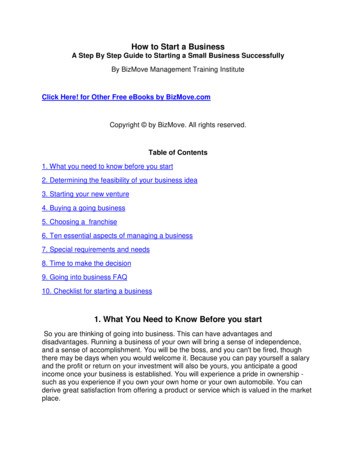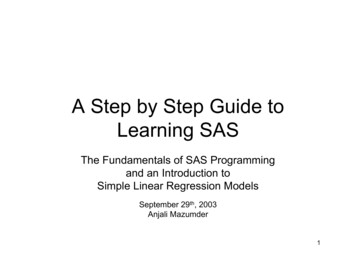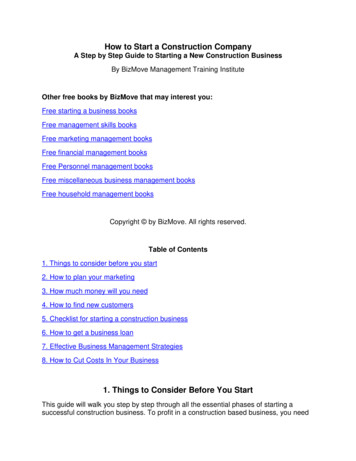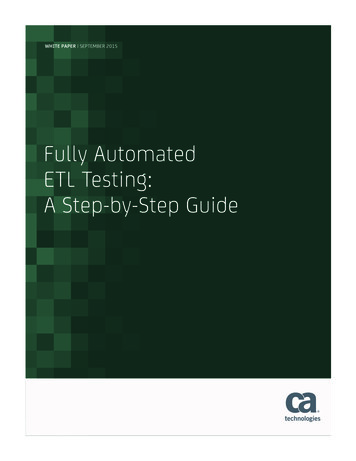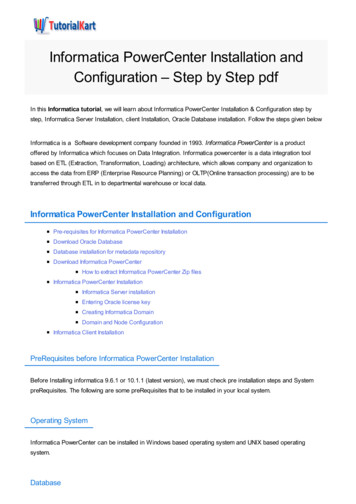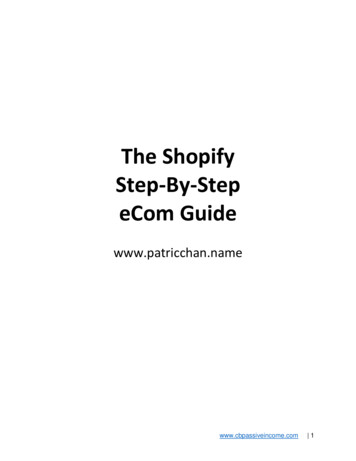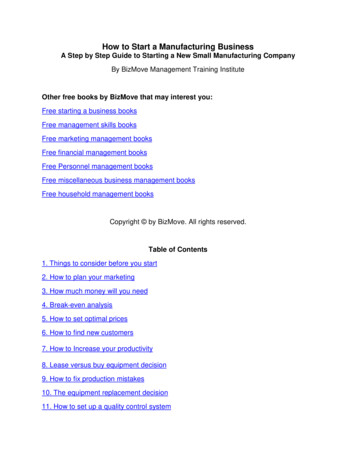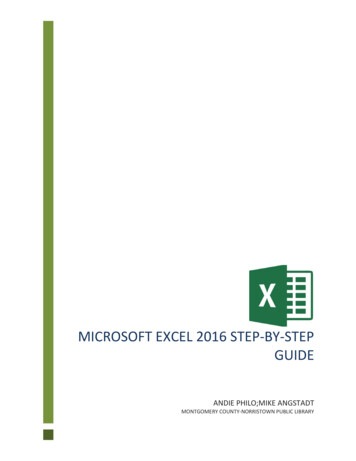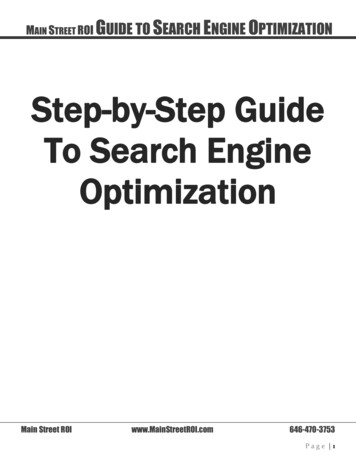
Transcription
MAIN STREET ROI GUIDE TO SEARCH ENGINE OPTIMIZATIONStep-by-Step GuideTo Search EngineOptimizationMain Street ROIMain Street 70-3753646-470-3753Page 1
MAIN STREET ROI GUIDE TO SEARCH ENGINE OPTIMIZATIONTable of ContentsIntroduction . 4Who This eBook Is For . 4Why Invest in SEO? .5Reason #1: It’s an Easy Sale .5Reason #2: Get In Front Of More Customers Than Ever . 6Reason #3: It’s Free . 6The 4 Biggest Misconceptions About SEO . 8Misconception #1: SEO Is 100% Free . 8Misconception #2: SEO Is a One-Time Event . 9Misconception #3: The Rules Of SEO Are Always Changing . 10Misconception #4: SEO Guarantees New Customers . 11SEO Ingredient #1: Research . 122 Critical Keyword Factors . 14SEO Ingredient #2: Relevance . 16How to Optimize Your Google Local Page . 16How to Optimize Your Website. 18SEO Ingredient #3: Reputation . 21Verify Your Ownership . 21Build Citations . 21Get Online Customer Reviews . 23Build Your Social Media Presence . 25Link-Building Tactic #1: Blogging . 27Link-Building Tactic #2: Guest Posting . 29Link-Building Tactic #3: Press Releases .30Link-Building Tactic #4: Submit to Directories .30Revenue: How to Get Customers from Google . 31Tip #3: Third Party Credibility Indicators . 32Tip #4: Make an Irresistible Offer . 32Main Street ROIwww.MainStreetROI.com646-470-3753Page 2
MAIN STREET ROI GUIDE TO SEARCH ENGINE OPTIMIZATIONTip #5: Call-to-Action . 32Tracking Your Return on Investment (ROI) from SEO . 33Google Places Dashboard . 33Google Places Offers . 33Google Analytics . 33Inbound Call Script . 33Customer Relationship Management (CRM) System . 34Step-by-Step SEO Action Plan & Checklist . 34Step 1: Research Your Keywords . 34Step 2: Demonstrate Your Relevance . 35Step 3: Establish Your Reputation . 35Step 4: Generate Revenue . 35How to Maintain Your Google Rankings Over the Long-Term .361. On-going Citations .362. On-going Reviews .363. On-going Links .36Additional Resources . 37Need Help With SEO? . 37Main Street Inner Circle . 37The Local SEO Formula . 38Free InfusionSoft Demo . 38Final Words . 38Will You Be My Next Success Story? .39Main Street ROIwww.MainStreetROI.com646-470-3753Page 3
MAIN STREET ROI GUIDE TO SEARCH ENGINE OPTIMIZATIONIntroductionThank you for purchasing The Business Owner’s Guide to Search Engine Optimization(SEO). In this eBook, I’m going to provide you with actionable advice you can use to startattracting customers from Google.But first, who am I, and why listen to me?My name is Phil Frost, and I’m the owner of a company called Main Street ROI thatprovides online marketing training for small business owners and marketingprofessionals. Since 2010, we’ve helped hundreds of small businesses create profitableonline marketing campaigns. Near the end of this eBook, I’ve included some morebackground information on me and my company, so you can learn more and get in touchif you want to.Who This eBook Is ForI created this eBook for business owners. My goal is to simplify SEO and make it easy foryou to take action and get results. For that reason, I’ve done my best to presenteverything in a simple, step-by-step, easy-to-understand fashion.And, as you’ll notice, this eBook isn’t very long. That’s by design. I’m a small businessowner too, and if you’re like me, then you’re short on time. While I could fill hundreds ofpages with SEO advice, I intentionally kept this eBook brief. I’ve only included the basicinformation you need to start ranking in Google, so you can get through it (preferably in asingle sitting) and start seeing results – fast.Here’s what we’re going to cover in this eBook: The value of SEO Why it’s easier than ever to rank #1 in GoogleMain Street ROIwww.MainStreetROI.com646-470-3753Page 4
MAIN STREET ROI GUIDE TO SEARCH ENGINE OPTIMIZATION The 3 biggest misconceptions about SEO Our 4-part recipe for profitable SEO How to track your return on investment from SEO Your step-by-step SEO action plan and checklist Advice on hiring an SEO company How to stay up-to-date on the latest best practicesWhy Invest in SEO?But before we talk about how to get ranked in Google, let’s define what we’re talkingabout, and make sure we’re on the same page about the value of search engineoptimization (SEO).If you want to show up in Google, you have two basic options: you can advertise withGoogle AdWords, or you can try to show up in the non-advertising results (known as the“organic” results).In this eBook, we’ll be talking about how to show up in the non-advertising results. Thisprocess is known as search engine optimization (SEO).And here are some good reasons to get started with search engine optimization rightaway Reason #1: It’s an Easy SaleSEO is one of the most straightforward ways to attract new customers because yourprospects are already looking for you. Your customers are already going to Google andsearching for exactly what you offer.Main Street ROIwww.MainStreetROI.com646-470-3753Page 5
MAIN STREET ROI GUIDE TO SEARCH ENGINE OPTIMIZATIONIf you show up in Google, they can find you, contact you, and hire you. SEO provides apretty simple sales and marketing process – much simpler than other methods ofmarketing, such as radio or TV or direct mail, where you have to try and interruptcustomers and convince them to contact you.When you’re ranking in Google, you have automatic credibility in your customers’ eyes.Customers come to you pre-sold on doing business with you because they assume you’rethe best when you’re ranking at the top of Google. If you can attract qualified prospectsby ranking in Google, then the sale is basically yours to lose at that point.Reason #2: Get In Front Of More Customers Than EverThe second reason you should invest in SEO is because more customers are searching foryou than ever before. And this is especially true if you own a local business. As you know,people are moving away from the Yellow Pages and are using search engines like Googleto find local businesses.According to Google, 97% of consumers use search engines to find local businessesonline. Google estimates that 20% of all Google searches are consumers searching forlocal businesses. Meanwhile, we’re witnessing a huge shift in the way people are searchingonline. More and more, people are using mobile devices – and according to Google, 40%of all mobile searches are for local businesses.Put this all together and you’ll realize there has never been more people searching foryour type of business in your area. And that means there’s never been a better time toinvest in SEO.Reason #3: It’s FreeAnd here’s the reason why you’re already interested. SEO can provide you with freecustomers.Main Street ROIwww.MainStreetROI.com646-470-3753Page 6
MAIN STREET ROI GUIDE TO SEARCH ENGINE OPTIMIZATIONThat’s why many people consider ranking in Google to be like the marketing Holy Grail.And it’s true that gaining top rankings for the right keywords can be incredibly valuable.One of my colleagues owns a business that generates more than 20,000 in profit per as aresult of his SEO rankings. I sure wouldn’t mind getting a free 20,000 check everymonth.Reason #4: SEO is easier than everThe fourth reason you should invest in SEO is because it’s actually easier than ever to getranked in Google – if you own a small, local business.Over the past couple years, Google has realized that consumers are searching more andmore for local businesses and so Google has started to really highlight local businessesin the search results.That’s why Google introduced Google Places – which was recently re-branded as Google Local. These are the map results you’ll often see if you search in Google for a localchiropractor or restaurant or dentist or plumber. And this shift in Google’s search enginealgorithm has been a godsend for local businesses.Previously, before this change, if you were a dentist, and people in your city or townsearched for a dentist, you’d have to be competing with tens of thousands of dentistsfrom all across the country. That’s way too much competition. There’s almost no wayyou’d get found.Meanwhile, your prospective client isn’t finding the results she wants, either. Googleunderstands that when a person is searching “dentist,” she probably wants to find a localdentist. And that’s why Google re-designed the search engine results to highlight localdentists.Main Street ROIwww.MainStreetROI.com646-470-3753Page 7
MAIN STREET ROI GUIDE TO SEARCH ENGINE OPTIMIZATIONThe introduction of Google Local is great news for you if you’re a dentist with a localpractice, because it means you’re no longer competing with tens of thousands of dentistsfrom all over the country. You’re only competing with the few dozen dentists in yourimmediate area.And luckily for you, most small businesses are NOT implementing best practices when itcomes to online marketing. So this can be your advantage. So that’s the third reason –SEO is easier than ever, especially if you’re a local business.The 4 Biggest Misconceptions About SEOBut before I outline my recipe for profitable SEO, I need to clear up some commonmisconceptions business owners have about SEO.Misconception #1: SEO Is 100% FreeJust a minute ago, I explained how SEO is valuable because it can provide you with freecustomers. And that’s true. When you’re ranking in Google’s organic results, the clicks arefree.However, it’s important to realize that SEO isn’t totally free. In reality, it takes aninvestment of either time or money to achieve and maintain those rankings. Either youhave to do it, or you’ll have to hire somebody to do it for you.If you’re considering hiring help, be sure to read the section later in this eBook that listsquestions to ask before hiring an SEO company.Main Street ROIwww.MainStreetROI.com646-470-3753Page 8
MAIN STREET ROI GUIDE TO SEARCH ENGINE OPTIMIZATIONAnd either way, you should be sure to track your return on investment (ROI) from SEO,so you know whether your investment of time or money is paying off. I talk abouttracking your ROI from SEO later on.Misconception #2: SEO Is a One-Time EventToo many business owners believe that SEO is just a setup process – that you can “set itand forget it,” as Ron Popeil used to say on late night TV. But this isn’t usually true.It’s possible that you have such weak competition that by making some basic edits to yourwebsite, you will out-rank your competitors. However, if you want to be successful withSEO over the long-term, you should stop thinking about SEO as an event – and startthinking about it as an on-going process.I like using the weight-lifting analogy to explain the proper long-term approach to SEO.With weight-lifting, you need to keep it up and stay consistent with it if you want to buildstrong muscles. You can’t just go to the gym one day or in one month and walk outlooking like Arnold Schwarzenegger.Also, just like in weight lifting, you don’t want to cut corners – you don’t want to takesteroids. I recommend you give up your search for an SEO “silver bullet” to improve yourGoogle rankings overnight, because those tactics often have disastrous long-termconsequences. You don’t want to do things that can get your website into trouble withGoogle. It’s just not work the risk of getting your website banned from Google forever.Google’s getting smarter and smarter every day. And the best practices I outline in thiseBook will keep you safe so you don’t have to worry about Google banning you.Main Street ROIwww.MainStreetROI.com646-470-3753Page 9
MAIN STREET ROI GUIDE TO SEARCH ENGINE OPTIMIZATIONNow, that said – it still is pretty common to see very fast results with SEO, just byfollowing the simple, proven best practices we teach here at Main Street ROI. Weconsistently receive success stories from new customers of ours who have followed ourbest practices and suddenly started appearing on the first page of Google within 30 days.How is this possible? Usually, these fast results are possible because of very weakcompetition. Most small businesses aren’t following the best practices I’m laying out inthis eBook. And so, if you simply implement our best practices, you can often jumpahead, quickly, and with no risk of getting penalized or banned by Google.However, SEO will likely only become more competitive in the future, as more of yourcompetitors catch on. For that reason, we recommend that you continue to reinvest inyour SEO over the long-term, so you continue to stay ahead.Speaking of long-term, another common misconception is that it’s nearly impossible tostay ahead with SEO over the long-term, because it’s always changing Misconception #3: The Rules Of SEO Are Always ChangingIn some respects this isn’t a misconception– it’s sort of true. Google is always changingthe details of its algorithm.Over the past several years, Google has made some significant changes. Years ago, Googleintroduced Google Places and started featuring local results more prominently. Then,Google introduced Google and started to integrate social media data into the searchresults. And then Google changed Google Places to Google Local And when youconsider all of these changes, it can seem overwhelming.Main Street ROIwww.MainStreetROI.com646-470-3753P a g e 10
MAIN STREET ROI GUIDE TO SEARCH ENGINE OPTIMIZATIONHowever, when you look at the big picture and take a long-term approach, you’ll see thatGoogle has actually been pretty consistent over the years. While the details of SEO areconstantly in flux, the fundamentals haven’t changed for years.My business partner and I first got our feet wet with SEO way back in 2005, so we’vewitnessed a lot of these changes over the years. Throughout all of these years, Google’sapproach has remained surprisingly constant. And, as a result, the rules of SEO remainlargely the same, from year to year.So, what does Google want? Google wants to feature the best results, the bestinformation, and the best local businesses. And they want to prevent “spam” fromclogging up the search results and ruining their users’ experience.Therefore, our long-term advice is to give Google what it wants. Don’t focus on trying to“game” the system and forget about silver bullets. If you focus on giving Google what itwants, you’ll win over the long-term. Follow our 4-part recipe and you’ll see your businessmove up and stay at the top of the search results.Misconception #4: SEO Guarantees New CustomersAnd there’s one more myth I want to clear up: The myth that if you get ranked in Google,you’ll automatically get new customers. This can be true, but it’s not necessarily true.Now, earlier in this eBook, I said that SEO is one of the most straightforward ways ofgetting customers. However, it’s not automatic and there are a number of ways that theprocess can break down if you’re not careful.In order to get customers from Google, all 5 of the following steps must occur:1. Your prospect needs to search for something relevant to the services you offer.Main Street ROIwww.MainStreetROI.com646-470-3753P a g e 11
MAIN STREET ROI GUIDE TO SEARCH ENGINE OPTIMIZATION2. You need to show up in Google.3. Your prospect needs to click and check out your website (or your Google Localpage).4. She needs to like what she sees and contact you.5. Finally, you need to close the sale.Obviously, getting ranked in Google is a critical step. But you need to have all of thepoints in that sequence working for you, or else it’ll break down.For example, if you’re ranking in Google for some phrase that nobody ever searches, thenobviously you won’t get any website visitors. And if you’re ranking in Google for somephrase that’s irrelevant to your business, then people may come to your website, but theywon’t contact you. And even if you attract website visitors and leads, you can losecustomers due to a lousy offline sales process.So, with that in mind, now let’s walk through the SEO best practices we recommendevery business follows. We call this our recipe for profitable SEO, and it has 4 parts.Here’s the recipe:Research Relevance Reputation RevenueNow let’s dive into this recipe in detail, and I’ll explain exactly what we mean by each ofthose ingredients SEO Ingredient #1: ResearchThe first step is to research the exact keywords your potential customers are using to findyour type of business in Google.Main Street ROIwww.MainStreetROI.com646-470-3753P a g e 12
MAIN STREET ROI GUIDE TO SEARCH ENGINE OPTIMIZATIONThis process is known as keyword research.Luckily, you don’t have to guess about what people are searching in Google every day.Google makes this information available to the public for free, through their keywordresearch tool. This tool is called the Keyword Suggestion Tool.Here’s the link to Google’s keyword ExternalYou can also find it by simply going to Google.com and searching “keyword tool” – it’ll bethe first result you find.As you’ll discover, this tool works like a thesaurus. Just type in the words you thinkpeople might use to find your type of business in Google, and Google’s keyword tool willgive you related search phrases, as well as data about how often the words and phrasesare searched.Here are some best practices to keep in mind when conducting keyword research for yourSEO campaign.Before you use Google’s tool, start by brainstorming keywords on your own. What wouldpeople search to find your type of business? Put yourself in your potential customer’sshoes. You may even want to ask your current customers what they’d search to find you.It’s really important to identify the actual words your customers would use, rather thanoptimizing around jargon words that only your peers and industry insiders would use.Once you’ve got an initial list of keywords that you think make sense, start enteringwords and phrases into the Google keyword tool and see what Google comes back with.Main Street ROIwww.MainStreetROI.com646-470-3753P a g e 13
MAIN STREET ROI GUIDE TO SEARCH ENGINE OPTIMIZATIONThen, the next step is to prioritize the keywords. There are two main factors you’ll wantto keep in mind when selecting the keywords you’re going to optimize for.2 Critical Keyword FactorsFactor #1: Search volumeObviously, if you want to attract a lot of new customers from Google, it’ll be important tofocus on keywords that are frequently searched. Google will tell you how often differentvariations of keywords are searched. The search volume is quoted on a monthly basis.Factor #2: RelevanceYou want to make sure to focus on relevant keywords. Especially when you’re just gettingstarted with SEO, you want to focus on keywords that have the highest possible chancesof delivering qualified customers. You don’t want to focus on what we call “tire kicker”keywords.Additional Keyword Research TipsHere are some additional tips to help you choose the right keywords.Hiring Intent: You want to prioritize keywords that demonstrate strong “hiring intent” –an obvious intent to hire a person or company like you. For example, if you’re achiropractor, I would recommend prioritizing “chiropractor” keywords above generic“back pain” keywords. And the reason is that a person who is searching for a chiropractoris much more likely to go see a chiropractor than somebody who is simply searchingabout back pain.Geographic Keywords: Also, if you want to attract clients in your area, pay attention togeographical keywords. For example, if you’re a lawyer in Dallas, you’ll want to identifythe exact phrases people search when trying to find a lawyer in Dallas. For example, theyMain Street ROIwww.MainStreetROI.com646-470-3753P a g e 14
MAIN STREET ROI GUIDE TO SEARCH ENGINE OPTIMIZATIONmay search: “Dallas lawyers” or “Dallas law firms”When brainstorming local keywords, a good technique is to mix and match phrases thatcontain your area and your service. For example: Dallas lawyers, attorney in Dallas, lawfirms in Dallas, and so on. You’ll be surprised how often very similar phrases can havesignificantly different search volume.For example – according to Google, “Dallas lawyers” is searched 390 times per month, but“Dallas law firm” is searched only 170 times per month. So, if you ranked #1 for “Dallaslawyers” instead of Dallas law firm, you would potentially get twice as many leads andclients. This is why proper keyword research is so critical to your success. A little bit ofextra homework up-front can pay significant dividends over the long-term.Get Specific: And also, be sure to focus on keyword phrases related to your specific areasof practice. So, for example, if you’re an attorney and you practice a specific type of law,such as personal injury law, then be sure to research those specific keyword phrases.This goes back to my earlier point about relevance. If you’re a personal injury attorney inNew York, it’s much more valuable for you to show up for “New York personal injuryattorney” than it is for you to show up for “New York attorney.” And don’t be afraid todrill down even deeper. For example, if you specialize in car accident cases, then researchthose specific phrases.Identify Local ‘Trigger’ Words: And here’s another tip to keep in mind if you want toattract local clients. Earlier I mentioned how Google is showing local business resultsmore frequently. This section of Google is called Google Local (and it used to be calledGoogle Places). Well, if you want to appear in these local results, I strongly recommendfocusing on keywords that are already triggering these local results. That way, you’ll havethe greatest likelihood of showing up in the local results and gaining maximum exposure.Main Street ROIwww.MainStreetROI.com646-470-3753P a g e 15
MAIN STREET ROI GUIDE TO SEARCH ENGINE OPTIMIZATIONOK, so at this point you’ve conducted your keyword research. And you’ve picked thekeywords you are confident will deliver a steady stream of highly qualified customers toyour business. I recommend you keep track of these keywords in a spreadsheet, so youcan easily refer back to them.Let’s move on to the next ingredient in the formula: Relevance.SEO Ingredient #2: RelevanceRemember what I said earlier about how you want to take a long-term approach to SEO?You don’t want to take short-cuts. That’s like taking steroids in our weight-liftinganalogy. You want to take a healthy approach that’s going to deliver results over thelong-term and not backfire. Well, that means giving Google what Google really wants.And what does Google want? As I said earlier, they want to show people the highestquality results possible. And one very important aspect of quality is relevance. Googlewants to make sure that your website or your Google Local page is perfectly relevant tothe keyword searched in Google.com.So how do you tell Google you’re relevant? You need to make edits to different parts ofyour website and to your Google Local page.How to Optimize Your Google Local PageIf you own a local business, I recommend you start by optimizing your Google Localpage, for a couple reasons. Google is making local results more and more prominent, andlocal SEO is still low-hanging fruit in many cities and towns. Plus, it’s very fast and simpleMain Street ROIwww.MainStreetROI.com646-470-3753P a g e 16
MAIN STREET ROI GUIDE TO SEARCH ENGINE OPTIMIZATIONto edit compared to editing your website, because you don’t have to get a webmasterinvolved in the process.So, if you haven’t already, you’ll need to create your Google Local page. If you’re not surewhether or not you have a Google Loca page, then search for your local phone number,business name, and address in Google Maps (http://maps.google.com). Does your listingalready exist?If not, then you’ll want to create one. When you go to http://maps.google.com, you’ll seea link at the top-left that says “Put your business on Google Maps” – and that’ll guide youthrough the process.Next, you’ll want to fill out all the different categories, including your business name,your description, and the relevant categories. And the most important places to includeyour keywords are in the Description field and in the Categories field. Be sure toinclude your target keywords in those two areas.But here’s a word of caution: Don’t over-optimize by stuffing too many keywords intoyour Google Local profile because Google’s becoming more sensitive about that, andover-stuffing your keywords could backfire.Here are a couple counter-intuitive points.First, I recommend you avoid including your keyword as part of your business name. Forexample, if you own a dental practice in White Plains, New York called Allan Weiss &Associates, don’t enter your business name as “White Plains Dentist – Allan Weiss” – justuse your real business name.Main Street ROIwww.MainStreetROI.com646-470-3753P a g e 17
MAIN STREET ROI GUIDE TO SEARCH ENGINE OPTIMIZATIONGoogle will eventually figure out your real business name based on information in otherlocal business databases. And once Google determines your real name does not includethe extra keywords you added, they will either change your name themselves orcompletely remove your profile.Also, only use basic keywords for your Category selections – don’t include geographickeywords in those phrases. For example, if you’re a New York City cosmetic dentist, justuse “cosmetic dentist” as a Category (and skip “New York City”). Google already knowswhere you’re located and using geographic phrases in category names is against theirTerms of Service.Next, as you’re filling out your page, be sure to complete all of the fie
Misconception #1: SEO Is 100% Free Just a minute ago, I explained how SEO is valuable because it can provide you with free customers. And that’s true. When you’re ranking in Google’s organic results, the clicks are free. However, it’s important to realize that SEO isn
